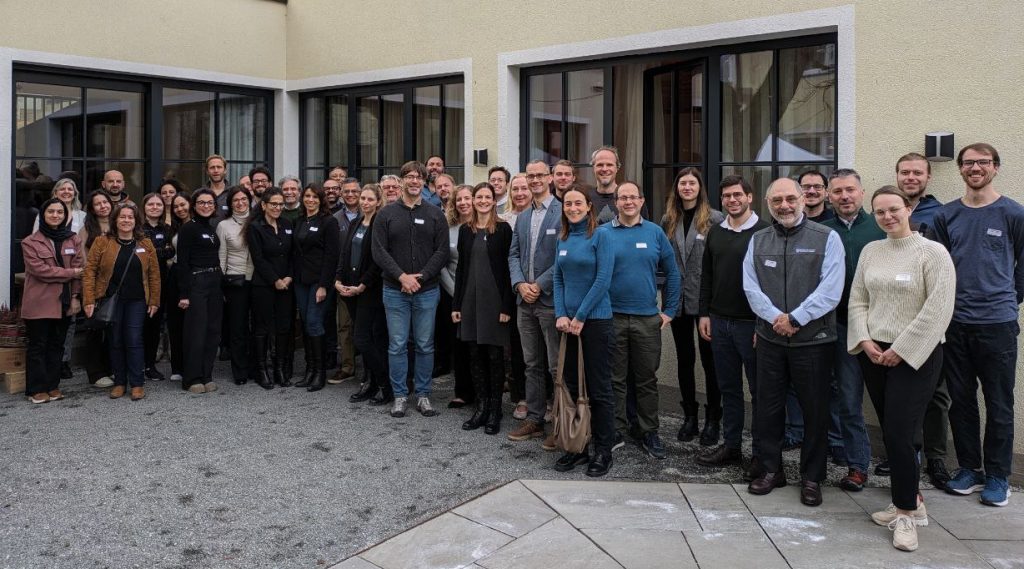New project kickoff: dAIbetes
In a significant stride towards advancing precision medicine, a consortium coordinated by Prof. Dr. Jan Baumbach from the University of Hamburg (Germany), with 13 partners from seven countries, including Egnosis, has been awarded a prestigious Horizon Europe grant to develop a cutting-edge federated health data infrastructure. The project named “dAIbetes” is revolutionizing Type 2 diabetes care. It focuses on leveraging virtual twins as predictive tools in personalized disease management, targeting treatment outcomes in type2 diabetes. The project started on 01 January 2024.
To develop virtual twins as prognostic tools for precision medicine the partners of dAIbetes will integrate extensive datasets from diverse sources. While respecting privacy legislation, the project employs federated learning, a privacy-enhancing computational technique. This allows the training of AI models on distributed datasets that stay behind safe firewalls at all times and are not uploaded into a cloud. In addition, this approach safeguards sensitive patient information while enabling effective use of big data.
Revolutionizing Type 2 Diabetes Care
In pursuit of its objectives, dAIbetes aims to achieve personalized prediction of treatment outcomes for patients with type 2 diabetes. This prevalent condition affects 1 in 10 adults globally, with annual expenditures of around 893 billion EUR. The partners will harmonize data from approximately 800,000 type 2 diabetes patients across four cohorts distributed across the globe in a specialized federated database network and use it to train prognostic virtual twin models. After validation, these models will be applied in real-world clinical practice through dedicated software. Ultimately, the results will aid in alleviating the current lack of guidelines for expected treatment outcomes for specific patients. The project seeks to demonstrate that personalized predictions from federated virtual twin models have a prediction error at least 10% lower than population average-based models.
On the whole, dAIbetes is a multidisciplinary consortium of experts in AI, software, privacy, security, and diabetes. The project will create a blueprint to overcome the privacy-big data conflict in cross-national diabetes research and beyond.
Additionally, the consortium is dedicated to pushing the boundaries of medical research. This endeavor aims to enhance patient outcomes and foster the worldwide progression of precision medicine.
The role of Egnosis
As lead of WP4, Egnosis is responsible for designing, architecture, and developing the virtual twin software platform that orchestrates the data handling- and training-related operational workflows. We will lead the overall development of the dAIbetes software platform following state-of-the-art industry standards. This includes the software development lifecycle (SDLC) methodology and the agile iterative development process.
Using a patient-centric, simplistic front-end app and state-of-the-art APIs, the platform will ensure intuitive data handling based on the harmonized data standards developed and implemented by our project partners.
Consortium members
- Universitaet Hamburg, Germany
- The Brigham Women’s Hospital, United States of America
- Friedrich-Alexander-Universitaet Erlangen-Nuernberg, Germany
- Gnome Design SRL, Romania
- Research Institute – Digital Human Rights Center, Austria
- tp21 GmbH, Germany
- SBA Research gGmbH, Germany
- Universita Degli Studi Della Campania Luigi Vanvitelli, Italy
- Universita Degli Studi Di Roma La Sapienza, Italy
- Medizinische Universitaet Wien, Austria
- Joslin Diabetes Center, United States of America
- Region Stockholm, Sweden
- Semmelweis Egyetem, Hungary

More information is coming soon via daibetes.eu (available soon), X, and LinkedIn.
Disclaimer: The dAIbetes project has received funding from the European Union’s Horizon research and innovation programme under Grant Agreement no: 101136305. The information contained in this press release are however those of the author(s) only and do not necessarily reflect those of the European Union.
